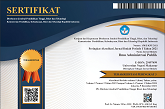Policy Evaluation of the Program Indonesia Pintar (PIP) in Indonesia's Education Outcomes
(1) Universitas Negeri Malang, Indonesia
(2) Universitas Negeri Malang, Indonesia
(3) Universitas Negeri Malang, Indonesia
(*) Corresponding Author
DOI: https://doi.org/10.26858/jiap.v11i2.30363
Abstract
The Program Indonesia Pintar (PIP) has been running for 6 years since it was first implemented. This policy aims to help the poor to get proper education from Primary school until their children graduate from Senior Secondary School as well as non-formal education. This study aims to evaluate the policy of the Program Indonesia Pintar (PIP) by comparing educational outcomes before and after this policy was implemented. The method used in this research is explanatory research with a quantitative approach. The data analyzed in the period before the implementation of the policy, namely in 2009-2014 and after the policy, namely in 2015-2020. The results showed that this policy was only effective at the junior high and senior high school levels. This policy is not able to cope with students who drop out and do not go to school, especially at the basic education level. The failure may be due to the lengthy requirements, the small amount of aid funds at the primary school level. The policy of the Program Indonesia Pintar is to increase student enrollment or education participation.
Keywords
Full Text:
PDFReferences
employment rate: Implications for sustainable human capital development in Nigeria. International Journal of Educational Development, 83(March), 102385. https://doi.org/10.1016/j.ijedudev.2021.102385
Barrow, L., & Rouse, C. E. (2018). Financial Incentives And Educational Investment : The Impact Of Performance-Based Scholarships. Education Finance and Policy, 13(4), 419–448. https://doi.org/https://doi.org/10.1162/edfp_a_00228
BPS. (2021). Indikator Pendidikan, 1994-2020. Badan Pusat Statistik. https://www.bps.go.id/statictable/2010/03/19/1525/indikator-pendidikan-1994-2019.html
Cierniak, K., Billick, R., & Ruddy, A. (2015). The Indiana Choice Scholarship Program: Legal Challenges, Program Expansion, and Participation. Informing Policy and Improving Practice (pp. 1–12). Center for Evaluation and Education Policy, Indiana University.
Damon, A., Glewwe, P., Wisniewski, S., & Sun, B. (2019). What education policies and programmes affect learning and time in school in developing countries? A review of evaluations from 1990 to 2014. Review of Education, 7(2), 295–387. https://doi.org/10.1002/rev3.3123
Kemendikbud. (2020). Statistik Pendidikan. Siswa, Jumlah Sekolah, Putus Jenis, Menurut Dan, Kelamin Tiap,Tingkat.http://statistik.data.kemdikbud.go.id/%0Ahttp://statistik.data.kemdikbud.go.id/index.php/page/smp
Kemendikbud. (2021). Program Indonesia Pintar. Kementerian Pendidikan Dan Kebudayaan. https://indonesiapintar.kemdikbud.go.id/
Maulana, D., & Nugroho, A. (2019). Kebijakan Publik Cara Mudah Memahami Kebijakan Publik. CV. AA. RIZKY.
Mawer, M. (2017). Approaches to Analyzing the Outcomes of International Scholarship Programs for Higher Education. Journal of Studies in International Education, 21(3), 230–245. https://doi.org/10.1177/1028315316687009
Meutia, I. F. (2013). Analisis Kebijakan Publik. AURA.
Mustari, N. (2015). Pemahaman Kebijakan Publik: formulasi, implementasi & evaluasi kebijakan publik. LeutikaPrio.
Němečková, T., & Krylova, P. (2014). The Czech government scholarship programme for students from developing countries - Evaluation findings and policy reflections. Evaluation and Program Planning, 43, 83–92. https://doi.org/10.1016/j.evalprogplan.2013.12.002
Patel, R., & Rudd, T. (2012). Can Scholarships Alone Help Students Succeed? SSRN Electronic Journal, November. https://doi.org/10.2139/ssrn.2188758
RI, D. (2020). Pembangunan Bidang Pendidikan: Perencanaan Yang Lebih Fokus Dan Berorientasi Ke Timur Indonesia Merupakan Solusi Atasi Kesenjangan Dan Percepatan Pencapaian Target Nasional. https://www.dpr.go.id/doksetjen/dokumen/biro-apbn-apbn-Pembangunan-Bidang-Pendidikan-Perencanaan-Yang-Lebih-Fokus-dan-Berorientasi-Ke-Timur-Indonesia-Merupakan-Solusi-Atasi-Kesenjangan-dan-Percepat-Pencapaian-Target-Nasional-1434364286.pdf.
Rusdiana, H. A. (2015). Kebijakan Pendidikan dari Filosofi Ke Implementasi. CV.Pustaka Setia.
Situmorang, C. H. (2016). KEBIJAKAN PUBLIK (Teori Analisis, Implementasi dan Evaluasi Kebijakan). Social Secururity Development Institute (SSDI).
Villareal, M. (2018). The Effects of Need & Merit Grant Aid on Graduation Rates : A Regression Discontinuity Analysis.
Ware, M., & Patel, R. (2012). Does more money matter? An introduction to the performance-based scholarship demonstration in California (pp. 1–12). https://papers.ssrn.com/sol3/papers.cfm?abstract_id=2030337
Article Metrics
Abstract view : 235 times | PDF view : 49 timesRefbacks
- There are currently no refbacks.
Copyright (c) 2022 Abd. Rohim Asnawi, Bambang Budi Wiyono, Asep Sunandar

This work is licensed under a Creative Commons Attribution 4.0 International License.
Diterbitkan oleh:
Program Studi Ilmu Administrasi Publik
Program Pascasarjana Universitas Negeri Makassar
JIAP Index By:

This work is licensed under a Creative Commons Attribution 4.0 International License.









